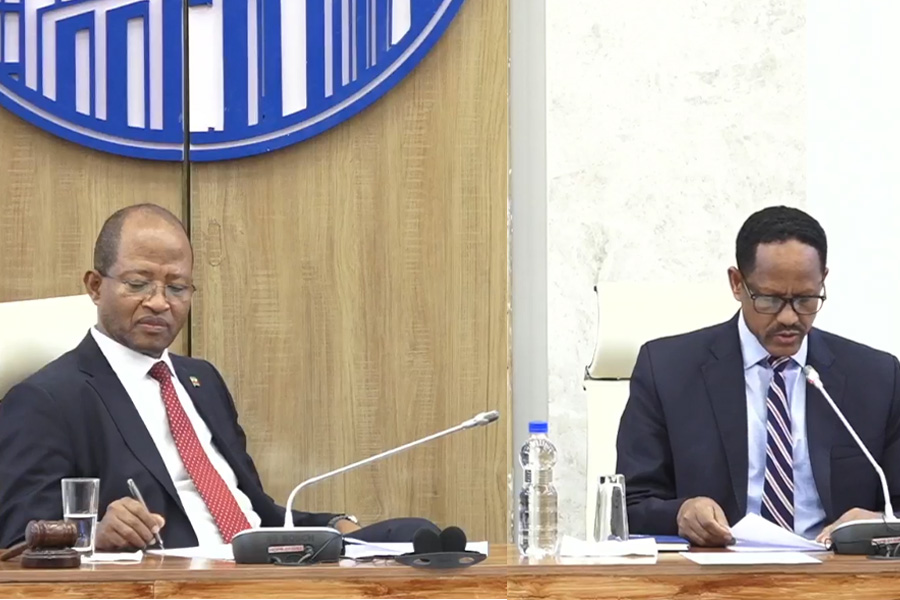
Apr 26 , 2025
By
Since 2018, Ethiopia has pursued an ambitious economic transformation under Prime Minister Abiy Ahmed (PhD), who promised prosperity through broad economic policy reforms. Despite optimistic rhetoric, the results have proven more worrisome than transformative. Rampant inflation, acute foreign currency shortages, mounting external debt, and a frequently shifting regulatory environment have cast doubt on the economic life.
Once hailed as Africa’s emerging economic powerhouse, Ethiopia drew praise for its robust growth rates and ambitious development projects. Today, however, the economy shows signs of deepening instability, raising difficult questions about the efficacy of its recent reforms.
When Abiy’s Administration announced its departure from decades of state-led control in favour of market liberalisation, the international community welcomed the shift. However, what followed has been marked by erratic policy implementation rather than structured economic policy reforms. Frequent regulatory adjustments have created an unpredictable environment, deterring potential investors and unsettling domestic businesses. Such uncertainty undermines the very confidence market liberalisation seeks to establish.
In recent years, Ethiopia has secured financial support from the International Monetary Fund (IMF), initially in 2019, with the support continuing into 2024. Intended as a stabilising measure, reliance on IMF funding instead revealed persistent fiscal vulnerabilities. Rather than reflecting sound fiscal management, repeated bailouts indicate a troubling dependency on external financial lifelines.
The introduction of the Ethiopian Securities Exchange (ESX) in January this year was celebrated as a major step toward financial modernisation. Yet, its limited success depicted broader systemic weaknesses. Low investor participation and liquidity challenges have kept the Exchange from becoming the economic beacon initially promised. Successful financial markets depend heavily on transparent and stable regulatory frameworks, elements conspicuously missing in the current economic environment.
Reforms in the banking industry intended to modernise financial institutions have stalled mainly, impeded by bureaucratic inefficiencies and outdated procedures. Banks continue operating under cumbersome regulations that restrict efficiency and innovation, stifling potential growth. Genuine reform demands substantial institutional restructuring, not superficial changes.
The agricultural sector, the foundation of the economy, also manifested the policy shortcomings. State interventions intended to modernise agro-processing and improve rural finance have achieved marginal success. Smallholder farmers remain dependent on outdated techniques, helming a bureaucratic burden without sufficient institutional support. Meaningful agricultural reform should move beyond rhetorical commitments toward comprehensive and sustained investment and policy clarity.
The anticipated industrial transformation, often hailed by officials, has also fallen short. Persistent infrastructure deficits, including unreliable power supplies, have severely limited the growth of the manufacturing sector. This has prevented the country from capitalising on potential industrial opportunities, further undermining economic diversification efforts. Neither efforts to transition to renewable energy sources, no less steered by a controversial ban on gasoline and diesel vehicle imports, have succeeded where ambitious policy initiatives have faltered.
The reality of underfunded infrastructure and inadequate planning has rendered these initiatives largely symbolic, rather than impactful.
Macroeconomic data show the growing disconnect between policy promises and the reality of life. GDP growth, once consistently robust, now exhibits marked instability driven by mismanagement and unpredictable policymaking. Fluctuations in growth rates increasingly appear less the result of strategic economic initiatives than the consequences of sporadic and unsustainable public investments.
The decision last year to shift to a market-determined exchange rate dramatically devalued the Birr, fueling an inflation rate that occasionally surpassed 30pc. The sharp depreciation severely impacted citizens, sharply eroding savings and living standards. Dwindling foreign exchange reserves have reached critically low levels, exacerbating economic uncertainty. Unofficial market rates consistently reflect an even grimmer reality than official statistics suggest.
The external debt, now exceeding 50pc of GDP, unveils severe fiscal imbalances. New loans, consistently portrayed as necessary for development, appear increasingly unsustainable. Current negotiations within the G20 Common Framework, intended to ease debt burdens, risk merely postponing inevitable economic consequences without addressing underlying structural issues.
Fiscal policy has also drawn criticism for contradictory practices. Despite repeated pledges of austerity and fiscal discipline, public expenditures remain high. Simultaneously, inefficient tax collection systems and a bloated public financial management framework impeded effective budget implementation. Income inequality has widened immensely, accompanied by rising social tensions.
From a geopolitical perspective, Ethiopia has failed to leverage its strategic position in the Horn of Africa. Domestic instability, compounded by violent conflicts in the Amhara, Oromia and Tigray regional states, has undermined investor confidence and disrupted vital international partnerships. The narrow export base and outdated trade policies further isolated the country from global economic integration opportunities.
Daily reports of financial turmoil have become commonplace, characterised by persistent inflation, currency volatility, and monetary instability. These are manifestations of market reforms undertaken without solid institutional foundations, which frequently produce disastrous outcomes. Institutional weaknesses remain pervasive, affecting everything from banking regulation to legal frameworks, making policy reforms ineffective in practice.
Political instability and widening socioeconomic disparities add further complexity to the economic challenges Ethiopia faces. Economic reforms implemented without adequate planning or institutional support risk perpetuating these problems, creating conditions ripe for a more profound crisis.
As the upcoming national elections approach, the country confronts tough choices about its economic future. Continued pursuit of current policies could risk more profound instability, while meaningful policies targeting economic stabilisation will require substantial recalibration. Fiscal prudence, transparent governance, and consistent regulatory frameworks emerge as critical factors in reshaping the dire economic reality.
PUBLISHED ON
Apr 26,2025 [ VOL
26 , NO
1304]

Fortune News | Nov 24,2024

Viewpoints | Apr 19,2025

Viewpoints | Oct 08,2022

Sponsored Contents | Jun 17,2021

Editorial | Feb 10,2024

Fortune News | Mar 06,2021

Radar | Oct 14,2023

Commentaries | Apr 13, 2025

Radar | Mar 23,2024

Radar | Dec 21,2019

Photo Gallery | 179082 Views | May 06,2019

Photo Gallery | 169280 Views | Apr 26,2019

Photo Gallery | 160158 Views | Oct 06,2021

My Opinion | 137147 Views | Aug 14,2021
Commentaries | Oct 25,2025

Dec 22 , 2024 . By TIZITA SHEWAFERAW
Charged with transforming colossal state-owned enterprises into modern and competitiv...

Aug 18 , 2024 . By AKSAH ITALO
Although predictable Yonas Zerihun's job in the ride-hailing service is not immune to...

Jul 28 , 2024 . By TIZITA SHEWAFERAW
Unhabitual, perhaps too many, Samuel Gebreyohannes, 38, used to occasionally enjoy a couple of beers at breakfast. However, he recently swit...

Jul 13 , 2024 . By AKSAH ITALO
Investors who rely on tractors, trucks, and field vehicles for commuting, transporting commodities, and f...

Oct 25 , 2025
The regulatory machinery is on overdrive. In only two years, no fewer than 35 new pro...

Oct 18 , 2025
The political establishment, notably the ruling party and its top brass, has become p...

Oct 11 , 2025
Ladislas Farago, a roving Associated Press (AP) correspondent, arrived in Ethiopia in...

Oct 4 , 2025
Eyob Tekalegn (PhD) had been in the Governor's chair for only weeks when, on Septembe...

Oct 25 , 2025 . By YITBAREK GETACHEW
Officials of the Addis Abeba's Education Bureau have embarked on an ambitious experim...

Oct 26 , 2025 . By YITBAREK GETACHEW
The federal government is making a landmark shift in its investment incentive regime...

Oct 29 , 2025 . By NAHOM AYELE
The National Bank of Ethiopia (NBE) is preparing to issue a directive that will funda...

Oct 26 , 2025 . By SURAFEL MULUGETA
A community of booksellers shadowing the Ethiopian National Theatre has been jolted b...